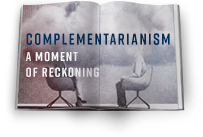Book Review: Openness Unhindered: Further Thoughts of an Unlikely Convert on Sexual Identity and Union with Christ
Rosaria Butterfield, Openness Unhindered: Further Thoughts of an Unlikely Convert on Sexual Identity and Union with Christ. Crown & Covenant Publishing, 2015. 206 pp. $13.00.
Reviewed by Mike Christ
How does the church faithfully articulate the biblical position on marriage and gender, while simultaneously caring for her members who are tempted with sins the culture has embraced as good? As I pastor, I ask this question often. Fidelity to Scripture requires we clearly explain the Bible’s view of marriage. We lead people astray if we present homosexual acts as anything less than sin before God. But how do we also provide real help for our brothers and sisters in Christ who struggle with same-sex attraction? “Just stop it!” has never been an effective sanctification approach. Yet if all we say concerning homosexuality begins and ends with, “It’s wrong,” have we unwittingly told our weak sheep that they must first perfect one aspect of their flesh before they can experience the normal sanctification by the Spirit?
Rosaria Butterfield’s latest book, Openness Unhindered: Further Thoughts of an Unlikely Convert on Sexual Identity and Union with Christ, provides exactly the kind of direction the church needs. Butterfield understands the homosexual lifestyle because she lived it. Not only that, she helped construct the homosexual movement. But she experienced “repentance unto life,” and as she writes about sexual identity as a believer, her writing oozes refreshing gospel truth.
SUMMARY
In her preface, Butterfield outlines the major themes of her book, themes that weave together a beautiful tapestry of the Christian life: Conversion, Identity, and Community.
Her discussion of conversion is at once a compelling story and a clear explanation of biblical theology—not surprising for English professor who came to faith by reading the Bible. As a radical feminist and lesbian, she sought to understand the book that inspired so much adversity to her cause. This proved more difficult than she expected. She realized that the Bible is one unit, one story, which encompasses everything. Therefore, it requires complete acceptance or rejection. Moreover, believing the Bible meant seeing herself within its story. The hermeneutical approaches Butterfield had used for literary analysis failed to account for the fact that the Bible claims to be written by an authoritative Being. She realized that if she took the Bible on its own terms, it made sense that God could set the standard for morality, including sexuality. Conversion meant coming into the story of redemption. Even more so than her previous book, Openness Unhindered displays the freeness of grace and the serious call to repentance in beautiful harmony.
Butterfield is refreshingly honest about the fact that coming into the Bible’s story does not alter our past nor mitigate every temptation in the future. It does, however, ground our identity clearly Christ. She recognizes that one’s identity is a complex thing. Patterns of sin rooted in our identity will not change overnight. And yet, the believer in Christ is made wholly new. Butterfield leans heavily on Romans 6 as she explains that the Christian’s identity is shaped by Christ’s death and resurrection. Our life story cannot be told simply with reference to our past acts or present desires. It must reach back further to the person of Christ in his death and resurrection for us and our death and resurrection in him.
Remarkably, Butterfield is careful to maintain a biblical balance as she explores identity in Christ and the fight against sin. She acknowledges that there will always be a gap between who we are in Christ and our behavior, and that to live the Christian life with integrity means fighting to make one’s position in Christ true in reality. “Identity in Christ, for me, always involves a healthy dose of war,” she writes. And because sin is nothing short of treason, there can be no truce. But grace is found in the midst of this war.
While writing about repentance, she pleads with those who struggle with same-sex attraction not to call themselves “gay Christians.” She admits that genuine Christians—her friends even—disagree. They think that self-representing as “gay” is just being honest about their life-defining battle. But the English professor here reminds us that modifiers matter. She writes, “You use words and words use you.” A sexual orientation contrary to God’s design is simply a “vestige of our flesh.” And as a child of God, a word that describes one’s sinful nature—gay—ought not to come before the word describing one’s truest identity—Christian. To bolster this point, she provides a helpful summary of the history of the discourse on sexuality, deconstructing the idea of sexual orientation. Readers will find her summary of Freud and Foucault to be accessible.
Finally, Butterfield takes the time to show how our self-representation connects us to community. We represent ourselves to others out of a “desire to known and be known. To let people know where we stand and to stand with them,” she writes. When we self-represent according to aspect of our fallen nature—even if it is only to be honest with that struggle so that we can fight it—we build a community around that aspect of our fallen selves. This is not the community that Jesus is building on the gospel.
In contrast, Butterfield presents a vision of community built on Christ that exemplifies radical love. Hospitality, she says, creates Christian community. It is the “‘by faith’ bridge to each other, through Christ.” Not surprisingly, she stresses that this practice should be an overflow of our identity in Christ. Adoption in Christ means having many siblings in the faith. What binds us together is not our shared hobbies or interests, but our shared future. She shares examples of her own family’s practice of hospitality. Hospitality in community is very personal for Rosaria, since the love she felt from believers while she was a “stranger” is what introduced her to the love of Christ.
EVALUATION
The strength of Rosaria Butterfield’s book is her insight into the holistic nature of sexual sin and the identity transformation of union with Christ. The organic connection of her themes—conversion, identity, and community—presents the Christian life with remarkable authenticity. Conversion means coming into the story of the Bible and the community that the story creates. Even though she deals with different themes throughout her book, they are always interrelated and interpenetrating.
Without a doubt, I want to put this book in the hands of anyone struggling with same-sex attraction or homosexual sin. I know of no other book that applies the gospel so deeply. I also want church members who don’t struggle in this way to read the book so that the words they speak are helpful when a brother or sister comes to them with this struggle. I want my non-Christian friends to read this book, not so much because I think they will be convinced by her testimony, but because of the compelling picture of Christian love.
Rosaria Butterfield has become a popular speaker on the topic of sexuality. But we sell her short—and even risk misunderstanding her message—if we look to her book as only pertaining to homosexuality. Her theme, in essence, is repenting of a sin of identity. If we think about it, all sin is really an issue of identity, because all sin is acting out of our old nature in Adam. All repentance, therefore, requires laying aside who we once were while also consciously putting on who we are becoming in Christ. The truth that Butterfield writes so elegantly about will help us battle any sin. And this is what makes her work so helpful for those struggling with same-sex attraction. She doesn’t isolate this struggle, but brings it into the light of gospel repentance.









